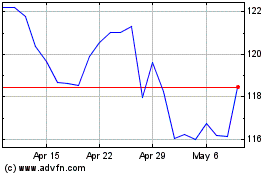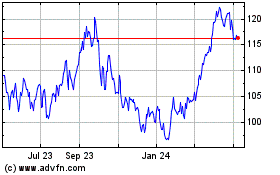By Bradley Olson and Lynn Cook
Exxon Mobil Corp. warned that it may be forced to write off
nearly 20% of its future oil and gas prospects due to low prices, a
comedown for a company that hasn't cut asset values during the
grueling energy bust.
Under investigation by the U.S. Securities and Exchange
Commission and New York state over its accounting practices -- and
the impact of future climate change regulations on its business --
Exxon on Friday disclosed that some 4.6 billion barrels of oil in
its reserves, primarily in Canada, may no longer be profitable to
produce.
Exxon is facing near- and long-term threats as it seeks to
exploit the full value of a vast oil and gas portfolio that
stretches from Texas to the Caspian Sea, and deliver the handsome
dividends that its shareholders have come to expect since it was
part of John D. Rockefeller's Standard Oil.
Today, the company is suffering amid a two-year plunge in oil
prices that has a barrel trading for around $50, a level Chief
Executive Rex Tillerson believes may linger as U.S. shale producers
ramp up at the first uptick in prices, prolonging the current glut
and putting a ceiling on any price upswing.
Longer term, it faces headwinds from new regulations aimed at
reducing carbon dioxide emissions, measures widely expected to fall
most heavily on the fossil fuels industry.
Earlier this year, Exxon lost the triple-A bond rating it had
held from Standard & Poor's Rating Services since 1930, a
standing of creditworthiness shared with just two other companies,
Microsoft Corp. and Johnson & Johnson. Last year, it failed to
find enough new oil and gas to replace what it produced for the
first time in two decades. Its profits in the last 12 months are
the lowest since 1999, before Exxon merged with Mobil Corp.
Exxon is alone among major oil companies in not having written
down the value of its future wells as prices fell. It now plans to
examine its assets to test whether they are worth less than carried
on its books, under rules governed by accounting standards. The
company said the 20% reserves reductions, which are governed by SEC
rules, may be necessary based on the average 2016 price by the end
of the year, though higher prices in November and December could
mitigate the extent of the decline.
In an investor call on Friday, Exxon declined to discuss
potential reserve write-offs or accounting write-downs in detail
beyond the initial statement. The SEC declined to comment on
Exxon's disclosure.
"Exxon has long been the best at what they do, but these
external constraints are putting them more in line with everyone
else, forcing them to the level of their competitors," said Sean
Heinroth, a principal in the energy practice at management
consultancy A.T. Kearney.
Though Exxon didn't mention climate change or regulators in its
disclosure, most of the assets it said it may not be able to
develop are among the most scrutinized by climate change activists:
Canada's oil sands.
Since 1999, energy companies have invested more than $200
billion in Alberta's oil sands, which has the third largest oil
reserves behind Venezuela and Saudi Arabia, says the Canadian
Association of Petroleum Producers.
Nine of the world's top oil companies, including Exxon, Chevron
and Royal Dutch Shell PLC, have been counting on wringing more
Canadian crude from the ground in the coming decades. Combined,
Canadian crude accounts for 23% of the firms' proven reserves,
according to data from investment bank Peters & Co. -- up from
only 5% in 2006.
New investments in the oil sands may be much harder to come by
after Exxon's announcement, said Andrew Logan, director of the oil
and gas program at Ceres, a Boston-based nonprofit that has pushed
Exxon and other companies for better disclosure on the potential
impact of climate change on the energy business.
"Why would any company invest billions of dollars in a new oil
sands project now, given the near certainty that the world will be
transitioning away from fossil fuels during the decades it will
take for that project to pay back?" Mr. Logan said.
The potential loss of reserves has broad ramifications for
Canada, which depends on the development of its crude stores to
support its economy, but like other western countries has been
moving to strengthen regulations to address climate change.
Canadian Prime Minister Justin Trudeau earlier this month unveiled
a national carbon-pricing proposal, sparking an immediate clash
between the national government and the province of Alberta.
The Liberal government's proposal to charge a price for carbon
emissions compounds the headwinds energy companies already face if
they want to mine Canada's oil sands for decades to come.
Amy Myers Jaffe, executive director for Energy and
Sustainability at University of California, Davis, said Exxon's
warning signals it doesn't believe oil prices will rise
significantly in the near future.
"This company had positioned itself for growth and oil sands
were a key part of its strategy," she said, adding: "If lots of
companies have to do write downs on their Canadian reserves, it
sends a gloomy message about the oil sands."
Exxon's other major obstacle: U.S. competition. Advanced shale
drilling techniques have unleashed a new wave of American oil. That
has made smaller American companies the industry's swing producers
able to ramp up quickly as prices rise.
Exxon shares fell 2.5% to $84.78 at 4 p.m. in trading on Friday
after reporting a 38% decline in quarterly profit compared with a
year ago.
Write to Bradley Olson at Bradley.Olson@wsj.com and Lynn Cook at
lynn.cook@wsj.com
(END) Dow Jones Newswires
October 28, 2016 16:58 ET (20:58 GMT)
Copyright (c) 2016 Dow Jones & Company, Inc.
Exxon Mobil (NYSE:XOM)
Historical Stock Chart
From Mar 2024 to Apr 2024

Exxon Mobil (NYSE:XOM)
Historical Stock Chart
From Apr 2023 to Apr 2024
